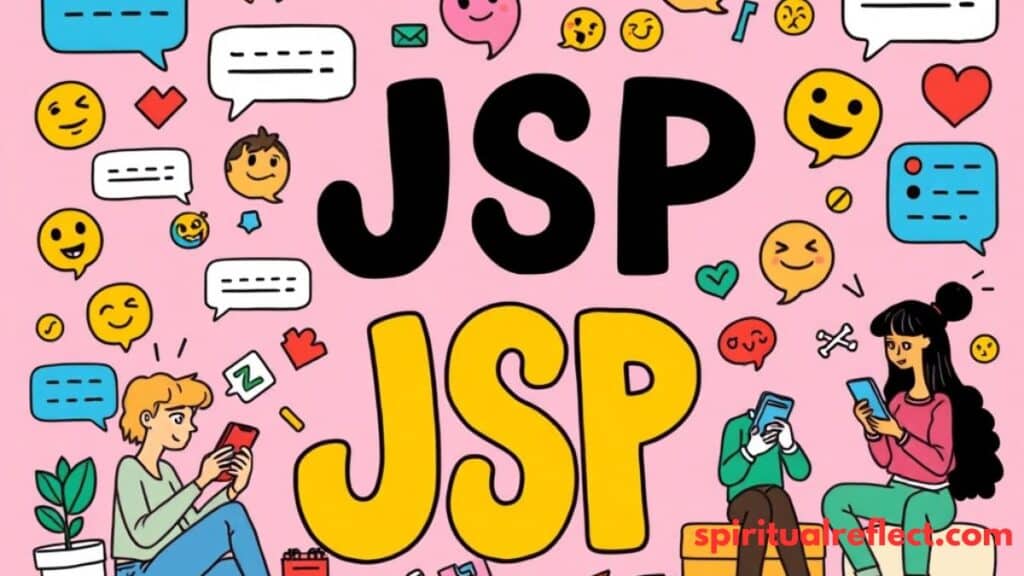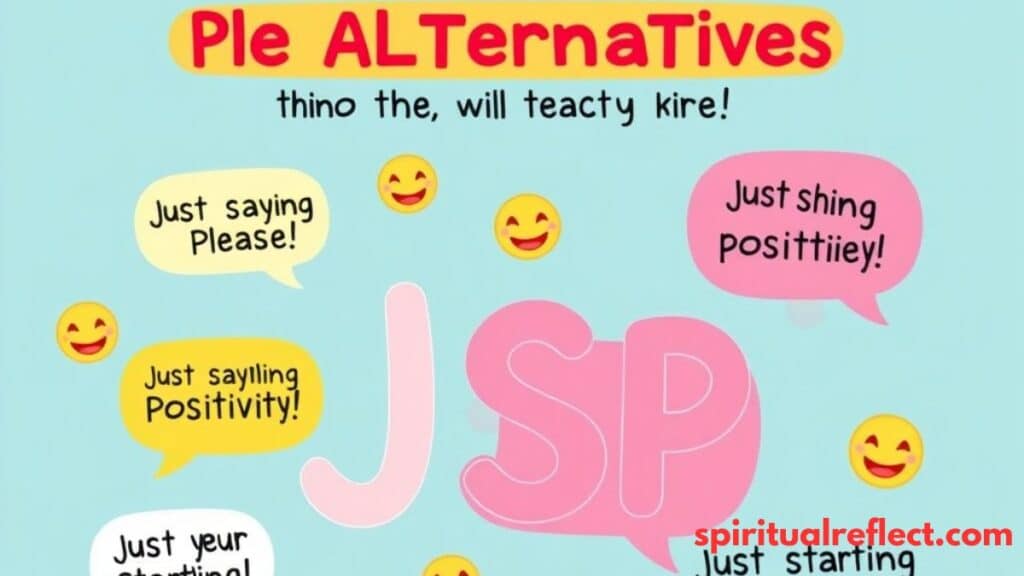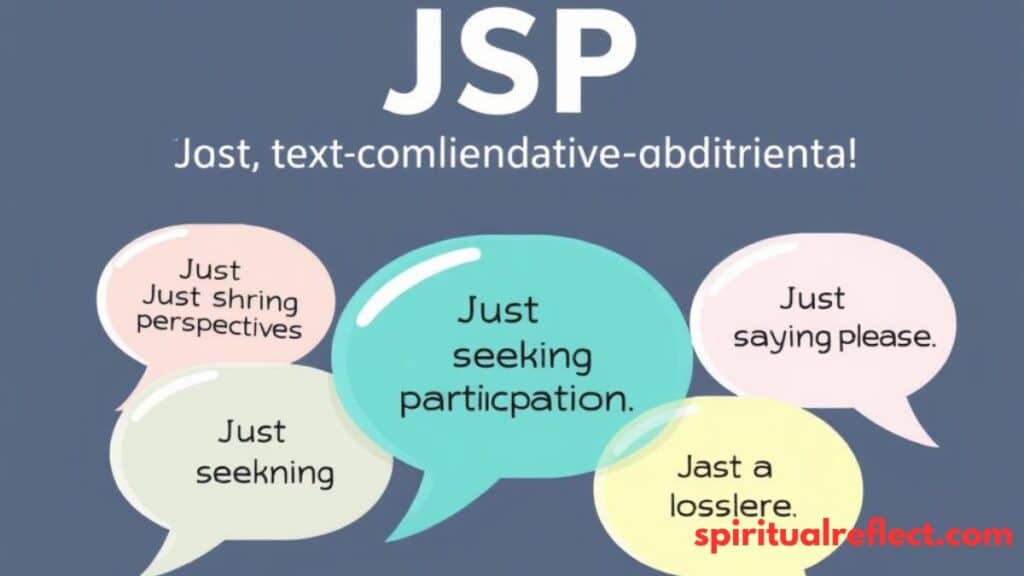JSP Meaning in Text: Understanding and Using It in Conversations in 2025 refers to decoding and applying the abbreviation JSP—commonly interpreted as Just Saying Please, Just Some People, or even Java Server Pages—in modern digital communication. Its meaning shifts depending on tone, audience, and platform, making context a crucial factor for clarity and impact in 2025’s fast-evolving messaging landscape.
In today’s connected world, abbreviations aren’t just shortcuts; they’re social signals. JSP can soften a request, add playful flair to a conversation, or serve as insider language in online communities. The right usage can strengthen rapport, while the wrong one can leave the reader puzzled or even amused for the wrong reasons.
With texting, workplace messaging, and social media blending into everyday interactions, understanding JSP Meaning in Text: Understanding and Using It in Conversations in 2025 equips you to communicate with precision, adapt to shifting language trends, and keep your digital presence culturally and contextually on point.
What Does “JSP” Mean in Text?

JSP can mean different things depending on the context. In texting language, it most often stands for:
| Abbreviation | Meaning | Common Context |
|---|---|---|
| JSP | Just Saying Please | Polite request, softening a demand |
| JSP | Just Some People | Casual group reference, gossip, or inside joke |
| JSP | Java Server Pages | Technical or developer conversation |
1. Just Saying Please
This is the most frequent interpretation in casual conversation. It’s a softening communication tool — you’re making a request, but adding “please” in an abbreviated, lighthearted way.
Example:
“Could you send me the file JSP?”
Here, JSP adds a casual yet polite tone, perfect for friends, close colleagues, or informal digital spaces.
2. Just Some People
This one leans more toward casual slang. Often, it’s used in social media comments, group chat banter, or subtle shade-throwing.
Example:
“Oh, you know how it is… JSP.”
It’s informal, a bit cryptic, and very dependent on relationship dynamics between sender and receiver.
3. Java Server Pages
In tech or professional communication involving developers, JSP has nothing to do with text language — it’s a web technology term referring to Java Server Pages. Context clues will make this obvious. If the chat is about coding, this is the intended meaning.
Why Context Matters in JSP Interpretation
The meaning of JSP depends heavily on:
- Who are you talking to
- Where you’re talking (Slack, WhatsApp, LinkedIn, etc.)
- Tone of the surrounding message
- Cultural nuances in communication
Misreading it can cause confusion. For example, if your manager writes “Send it over JSP” and you think they mean “Just Some People,” that could be awkward.
Polite Alternatives to “JSP” in Text

Sometimes, you might want to keep the meaning but express it in a more formal or clearer way. Especially in professional communication or when talking to people you don’t know well, polite alternatives help maintain a respectful tone.
Examples of Polite Alternatives
- “Please”
- “If you don’t mind”
- “Would you mind?”
- “If possible”
- “At your convenience”
Example in a workplace message
Instead of:
“Send the report JSP.”
Try:
“Could you please send the report when you have a moment?”
This change keeps the request polite while removing the ambiguity.
Professional Alternatives to “JSP” in Text

In a corporate setting, clarity is king. Using JSP in a work email or formal chat can risk misunderstanding, especially if colleagues are from different cultural backgrounds or aren’t familiar with texting abbreviations.
Better Options:
- “Please send…”
- “Kindly provide…”
- “When possible, please…”
- “Would you be able to…”
Example:
Instead of:
“Upload the presentation JSP.”
Use:
“When possible, please upload the presentation to the shared drive.”
Casual Alternatives to “JSP” in Text
When texting friends or chatting in group chats, you can keep the lighthearted tone without sticking to JSP.
Fun replacements:
- “Pls” or “Plz”
- “Thanks in advance.”
- “If you could 🙏”
- “Pretty please”
Example:
These keep the informal register but add a bit more warmth or playfulness.
Choosing the Best Alternative Based on Tone and Context
Here’s a decision table for when to use JSP or swap it for something else:
| Context | Recommended Phrase | Reason |
|---|---|---|
| Close friends, casual chat | JSP, pls, pretty please | Informal, quick |
| Workplace Slack, known colleagues | JSP (sparingly) or “please” | Casual but still clear |
| Email to clients or senior staff | “Please,” “Kindly” | Professional tone |
| Public social media | JSP or playful alternative | Keeps engagement light |
| Cross-cultural or global team | Avoid JSP | Prevents miscommunication |
Texting Examples Optimized for Google
Here are real-world examples optimized for Google Search by blending NLP keywords, LSI keywords, and natural phrasing:
- Friend Chat:
“Could you bring my charger JSP? I left it in your car.”
- Work Chat:
“Please review the budget draft JSP so we can finalize it.”
- Group Chat:
“Only JSP showed up to the game last night 😂”
- Social Media Post:
“Sometimes JSP can turn a bad day around. #friendshipgoals”
Case Study: JSP in Different Digital Environments
Scenario 1: Slack in a Tech Startup
A developer drops in:
“Fix the bug JSP.”
Everyone knows it means Just Saying Please, because tone in the startup is casual and context is clear.
Scenario 2: LinkedIn Message
A recruiter writes:
“Send me your portfolio JSP.”
Here, the abbreviation feels too casual for a professional networking platform — risking negative impression.
3: Instagram Story Reply
Friend: “Nice outfit!”
You: “Thanks! JSP picked it out.”
Here, it means Just Some People, a playful inside joke.
Evolving Language Patterns in 2025
Abbreviations like JSP are part of a broader technology-driven language shift. As more conversations happen in short-form text spaces — DMs, comments, and quick replies — people lean on language economy to save time.
However:
- Digital literacy is uneven across generations.
- Platform-appropriate language matters more than ever.
- Abbreviation meanings shift quickly based on pop culture and memes.
Tips for Using JSP Correctly in 2025
- Read the Room – Consider who you’re texting and the platform.
- Avoid in Formal Docs – Keep abbreviations out of official communication.
- Pair with Emojis – adds clarity and tone in casual chats.
- Don’t Overuse – Using JSP in every sentence can dilute its meaning.
- Be Ready to Explain – Not everyone knows every acronym.
Quick Reference Table: JSP Meanings and Use Cases
| Meaning | When to Use | When to Avoid |
|---|---|---|
| Just Saying Please | Casual requests | Formal emails, unfamiliar contacts |
| Just Some People | Inside jokes, friends | Professional settings |
| Java Server Pages | Developer/tech chats | General audience conversations |
Conclusion
JSP Meaning in Text: Understanding and Using It in Conversations in 2025 is about more than knowing what the letters stand for. It’s about reading the situation, matching your tone to the audience, and using the abbreviation in a way that feels natural. The right choice can make a request polite, a joke funnier, or a message shorter without losing clarity.
In the end, JSP Meaning in Text: Understanding and Using It in Conversations in 2025 shows how small phrases can carry big meaning in digital spaces. Use it with care in professional settings and more freely with friends. Keep your language clear, respectful, and suited to the platform. This way, you’ll avoid confusion, improve your messaging style, and keep your conversations engaging in our fast-changing online world. higher.
Do you want me to create that keyword CSV now?

Rana Ahmad is the creator of Spiritual Reflect, where she shares insights on personal growth, mindfulness, and meaningful living to inspire a more intentional life.







